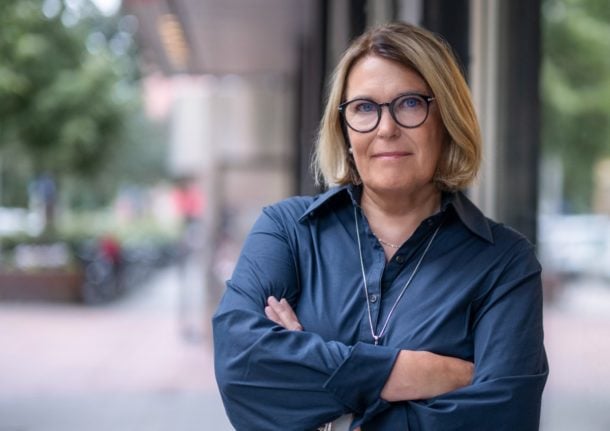Kristina Kovač remembers the exact moment she decided to move her family to Stockholm.
“It was in Götgatan, the small part of Götgatan where it goes uphill towards Slussen, and it was a nice day for a change. Blue skies, wonderful Swedish blue skies, and young people, beautiful people, happy people going around with their kids and everything,” she tells The Local.
“I just looked at them and I remembered what normal life is supposed to look like, because that’s one thing that we forgot in Serbia unfortunately.”
After the dissolution of Yugoslavia in the 1990s, Kristina said there was a noticeable change in the atmosphere of the country, where years of struggles had made their mark on society and the people.
“For me it’s important what’s around me, what kind of a setting, are other people happy, are we all together as a nation going to a good place or not. That’s why I needed to go.”
Kristina’s career as a writer and composer had already brought her to many different countries.
She was immersed in the world of music from an early age. Her father, Kornelije Kovač, was a musician, songwriter, composer and producer. Having attended music school, where she learned how to play the piano, she wrote her first song at the age of 13.
At the age of 16, both Kristina and her sister Alexandra sang the backing vocals for the singer who represented Serbia in the Eurovision contest, which took place in Rome in 1991.
In 1995, Kristina and her sister released their first music album, titled K2, with their second album, Malo Soula, being released the following year in 1996. Kristina then dropped her solo album in 2007, and she was a judge and mentor on X Factor Adria in 2013.

Her visit to Stockholm was love at first sight, but because Serbia is not a member of the EU, moving to Sweden was far from a matter of packing her bags and getting on the first flight.
Because her grandfather was from Hungary, however, she was able to apply for a Hungarian passport with only one big condition attached to it: she had to learn to speak Hungarian.
“For two years I was on and off with my professor studying. I went to the interview in the embassy, then waited for nine months to hear whether it was OK or not. I had to learn all the time because you must not forget it until you get your passport, so it was really stressful. For me it was very important because it was my only ticket to Sweden, and I knew I wanted to move my family here.”

Once she had cleared the hurdles and moved to Stockholm, new challenges appeared.
For three months, Kristina found herself applying to many different job ads and going around with her CV to businesses all across the city, and still struggled to find a job. But she never gave up hope.
“When you’re happy with something big that you’ve done [moving to Stockholm], I was like ‘OK, I’m here now and I’m going to make this work. I’m not going back’,” she says.
It was a chance encounter that eventually helped her land a career in Sweden.
One day, she saw an article about an Australian girl, Grace, who won a competition run by the Abba Museum in Stockholm to become an international member of the Abba Choir and perform at the 40th anniversary of Abba winning Eurovision, and she reached out to her.
After making that connection and telling her that she was looking for a job in Stockholm, Kristina was advised to visit a co-working space where she could work from. That’s where she met a Brit, Tony, a musician, songwriter and entrepreneur, and it would turn out to be a crucial meeting.
When Kristina, frustrated with her job hunt, posted on Facebook that she was considering looking for cleaning jobs since she was not offered a position in any other sector, she received a message from Tony.
They scheduled to meet for a coffee and after three hours of meeting and chatting about what job would suit her best, he called and offered her a job for an AI startup, doing data labelling and office management.
“This is one of those miraculous things where one small thing leads to another small thing which changes your life,” says Kristina. “So, at [age] 45, I got this wonderful chance because of this wonderful man who just did this for me because he saw the potential in me and he wanted to help.”
However, Kristina’s passion for music was still there and after four years she was tired of the office job, so she decided to set up her own music business – K’s Music Hub – and work for herself.

She’s now getting ready to launch K’s Music Hub’s first project: establishing two choirs.
The first choir is The Melting Pot Collective Choir, inspired by her experience in creating close connections in a new country. They will sing contemporary pop and rock music, from classics to contemporary hits.
“The concept is to have both immigrants and Swedes. But the whole point is to bring people together,” she says, noting how she’s found some of the Swedish stereotypes not to be true.
“I’ve been hearing complaints from people who moved here like ‘oh, they’re cold, they don’t want to be friends and they’re like this’ and people always complain. I was always defending the Swedes in the sense of, ‘wait a minute, they’re not cold, they’re just shy’,” she says.
She encourages other newcomers not to be afraid of taking the first step to befriend Swedes.
“It’s their culture. They were brought up not to initiate, not to push themselves upon people. So, the initiative has to come from us, the newcomers, but they always respond very positively to any initiative.”
The second choir is called Brotherhood and Childhood – a play on words as the words are very similar in Serbian – and is aimed at bringing together people from the former Yugoslavia.
“I really want people to love each other for being people, for being good, for being kind, for loving music, for being talented, for doing something together, creative,” she says.
Like all other aspects of her company, Kristina will be overseeing both choirs.
“I will be the choir leader and the vocal arranger.” Along with that she will be “doing the rehearsals, teaching people, helping members articulate their voices and working on vocal technique during the choir rehearsals”.
There will be a group audition for The Melting Pot Choir on March 12th and for the Brotherhood and Childhood Choir on March 13. The spring semester will consist of 12 rehearsals with the final performance taking place in June.
Nevertheless, Kristina explains that the criteria are not difficult to meet.
“I had many questions from people who wanted to apply. How good do I need to be? I say, you don’t have to be overly good. You don’t have to be a great singer. You just have to be able to carry a tune in tune. It is quite enough to be able to carry a tune and have the basic choir singing skill – sticking to your line while other people stick to theirs. That should be quite enough for the choir to sound great in no time.”



 Please whitelist us to continue reading.
Please whitelist us to continue reading.
Member comments